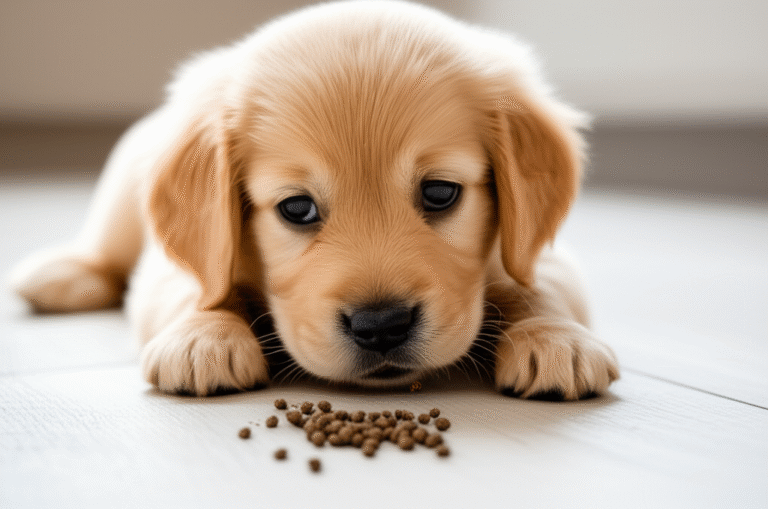- The Short Answer: Can Dogs Eat Guinea Pig Poop?
- The Risks: What Happens If Your Dog Eats Guinea Pig Poop?
- Why Do Dogs Eat Guinea Pig Poop Anyway? Unpacking This Odd Behavior
- How To Stop Your Dog From Eating Guinea Pig Poop: Practical Solutions
- When To Worry: Signs Your Dog Needs a Vet After Eating Guinea Pig Feces
- Our Final Take
- FAQs About Dogs and Guinea Pig Poop
Can Dogs Eat Guinea Pig Poop?
Generally, no. While a small amount is unlikely to be life-threatening, it can expose your dog to parasites and bacteria, potentially causing digestive upset. We need to prevent this behavior.
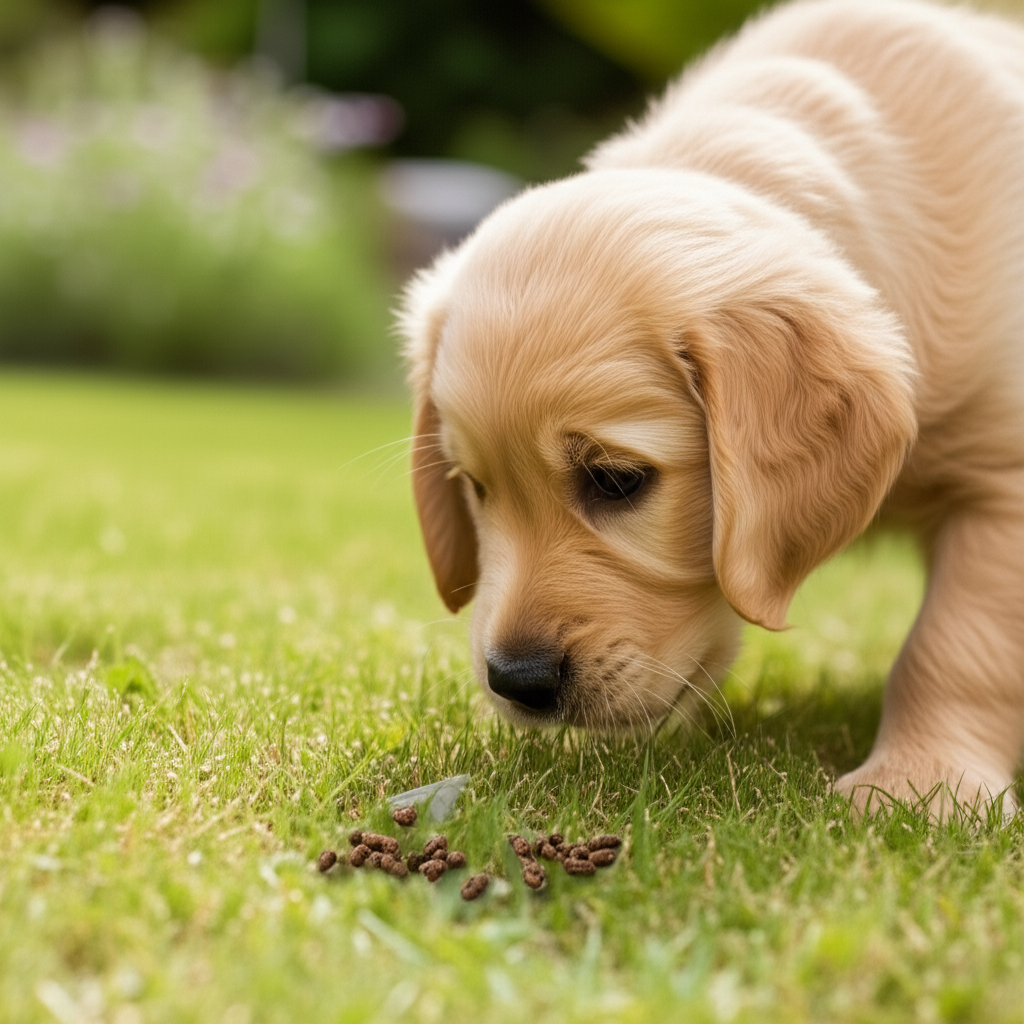
—
Okay, let’s cut to the chase. You’ve got a dog, you’ve got a guinea pig, and you’ve probably seen your dog doing something… less than appealing. That quick sniff, that suspicious gulp, and suddenly you’re asking, “Can dogs eat guinea pig poop?” It’s a pretty gross habit for us humans to wrap our heads around, but for dogs, it’s often just another Tuesday.
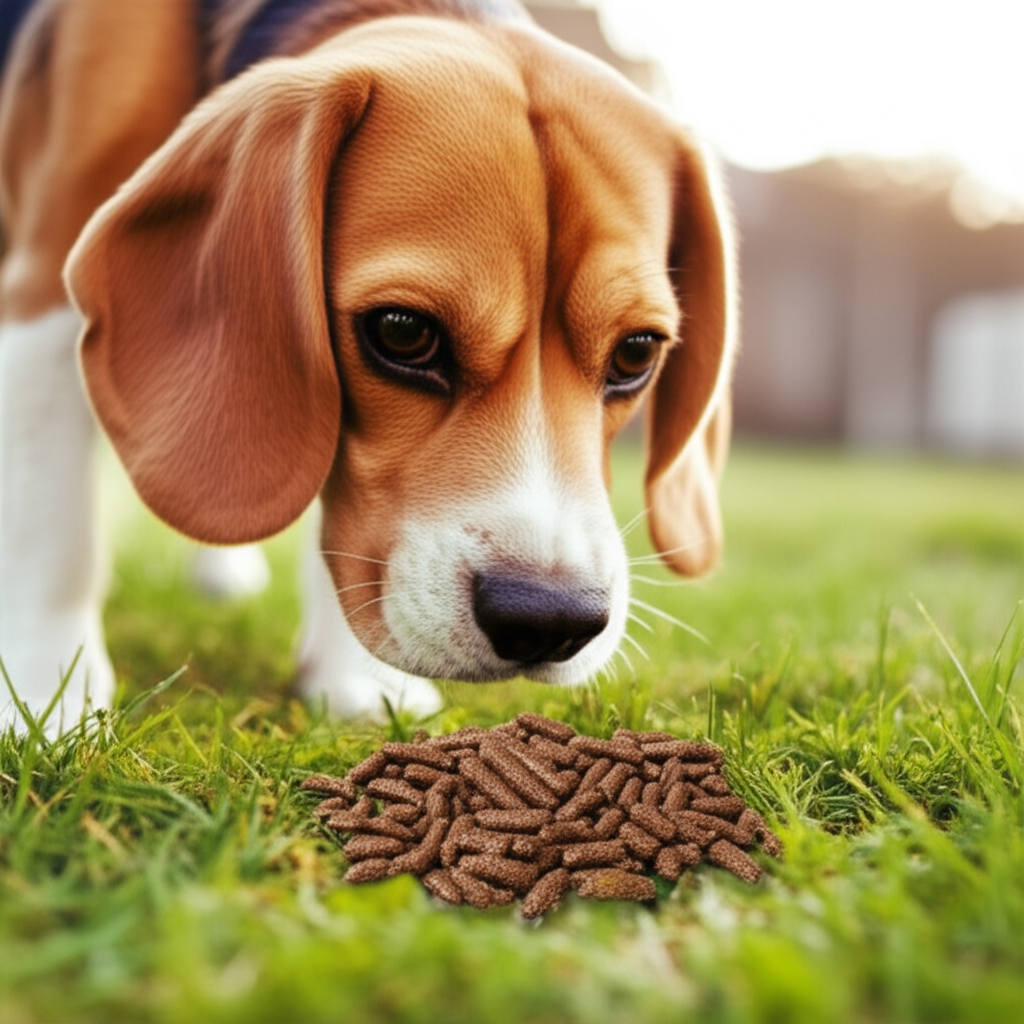
We get it. Your main worries are probably: Is this dangerous? Will my dog get sick? And, seriously, how do I make them stop? We’re going to talk straight, no fluff, about why this happens, what the real risks are, and what we can actually do about it. Because peace of mind (and a clean floor) is something we can all agree on.
The Short Answer: Can Dogs Eat Guinea Pig Poop?
Let’s be real. It’s not ideal. No, we shouldn’t encourage it, and we definitely shouldn’t consider it a part of their diet. Think of it like us accidentally eating something off the floor – probably not going to kill us, but it’s certainly not recommended and we’d feel pretty gross about it.
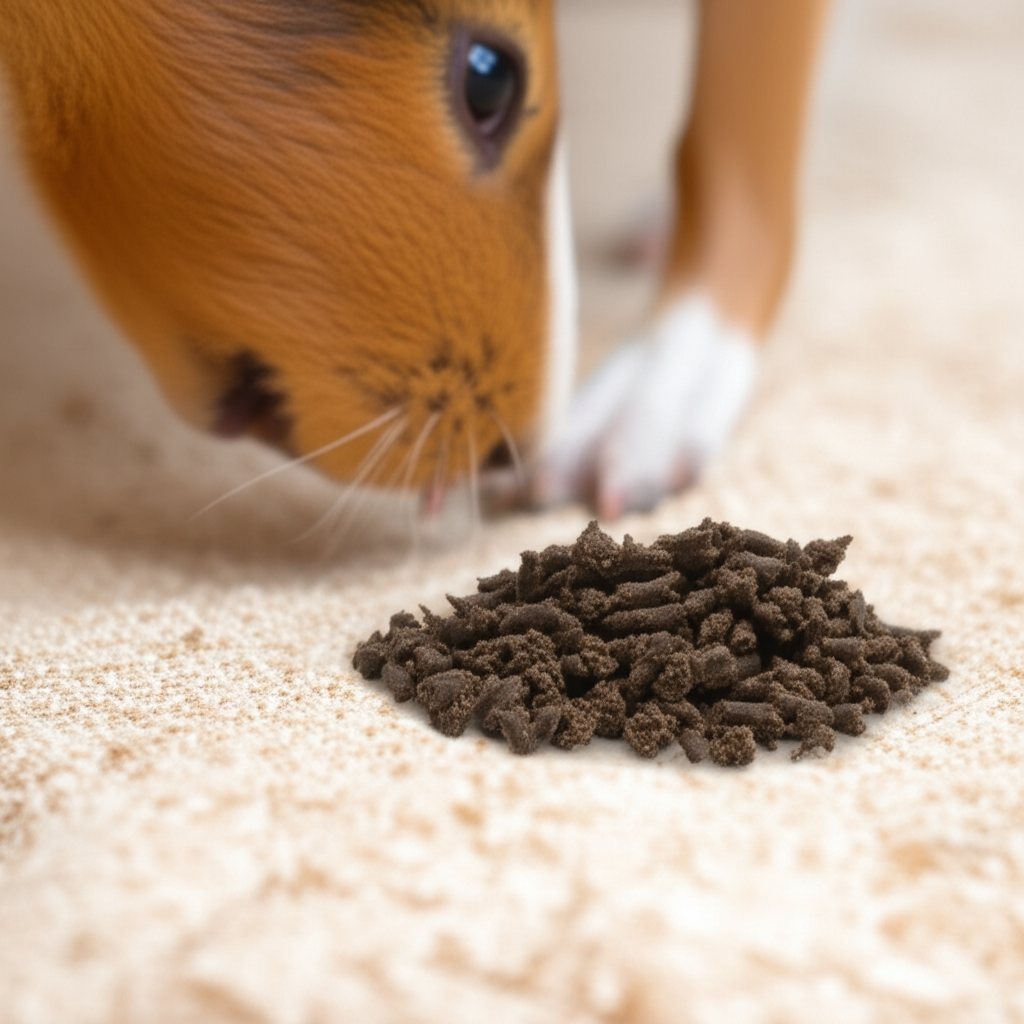
Dogs are natural scavengers. Their ancestors didn’t have perfectly portioned kibble; they ate what they found. Sometimes, that meant eating the droppings of other animals, like a natural, if unappetizing, recycling program. Guinea pig poop, especially, can look and smell “interesting” to a dog. It might contain undigested nutrients, or just be a novelty they’re curious about. The main thing is, while a tiny, one-off nibble might not land you in the vet ER, it carries risks. And those risks are what we need to zoom in on.
The Risks: What Happens If Your Dog Eats Guinea Pig Poop?
This isn’t about scare tactics; it’s about being informed. When your dog chows down on guinea pig droppings, we’re looking at a few potential hazards. Most of the time, your dog will be fine, maybe a little upset stomach. But sometimes, it can be more serious.
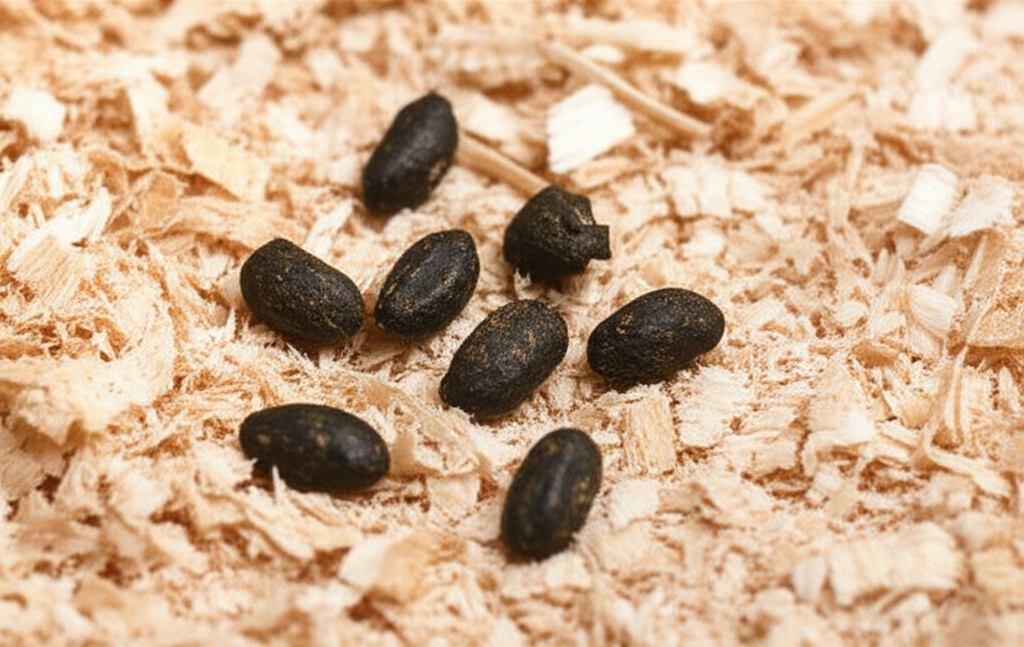
Here’s what we need to keep in mind:
Parasites: This is probably our biggest concern. While many guinea pig specific parasites aren’t easily transmissible to dogs, some, like Giardia or certain intestinal worms, can cross species. If your guinea pig has them, your dog could pick them up. These can lead to symptoms like diarrhea, vomiting, weight loss, and general malaise.
Bacteria: Guinea pig poop can contain bacteria like Salmonella or E. coli. While many dogs have robust digestive systems that can handle a lot, a heavy load of these bacteria can cause severe gastrointestinal issues.
Medication Residue: Is your guinea pig on any medication? Even small amounts can pass through their system and end up in their droppings. If your dog eats enough of it, they could ingest medicines not meant for them, leading to adverse reactions.
Digestive Upset: This is the most common outcome. A new, unusual, and frankly, unhygienic item in their diet can throw off your dog’s digestive system. We’ve seen it many times: a little vomiting, diarrhea, or just general “tummy grumbles” following a forbidden snack.
Choking Hazard (Unlikely for Poop, but for other debris): While guinea pig poop itself isn’t a choking hazard, if your dog is rummaging in the cage for droppings, they might inadvertently try to eat other small bits of bedding or accessories that could be an issue.
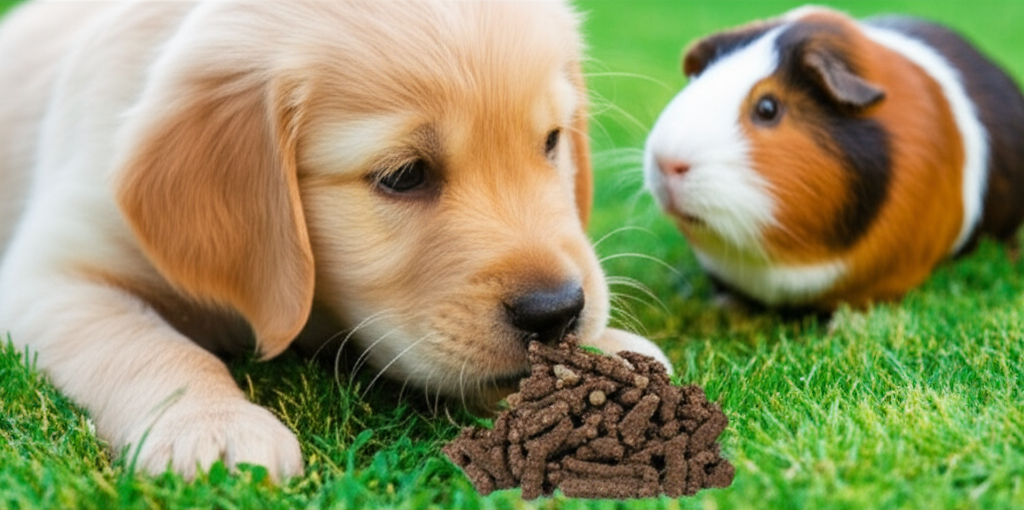
The biggest takeaway here is: we can’t know for sure what’s in that specific piece of poop your dog just ate. So, prevention is always our best strategy.
Why Do Dogs Eat Guinea Pig Poop Anyway? Unpacking This Odd Behavior
It feels gross to us, right? But for dogs, there are reasons behind the madness. It’s not usually about being “bad”; it’s about instinct, environment, and sometimes, even their health.
Natural Scavengers: Dogs are opportunistic eaters. If something smells like food (or just interesting), they’ll investigate. Guinea pig poop often contains partially digested plant matter, which can smell appealing to a dog.
Boredom or Curiosity: Sometimes, it’s as simple as your dog being bored. A guinea pig cage offers new smells and “treasures” to explore. Like a kid finding a shiny penny, a dog might just be curious about what this little brown pellet is all about.
Nutritional Deficiencies (Less Common): While often cited, it’s rarely the primary reason for a well-fed dog eating poop. However, if your dog isn’t getting all the nutrients they need from their regular food, they might try to seek them out elsewhere. But for most dogs on a balanced diet, this isn’t the main driver.
Attention-Seeking: If every time your dog goes near the guinea pig cage, you react strongly (even if it’s just telling them “no”), they might learn that this behavior gets your attention. Not the best kind of attention, but attention nonetheless.
Understanding why they do it helps us figure out how to stop it. It’s not just about reacting; it’s about addressing the root cause.
How To Stop Your Dog From Eating Guinea Pig Poop: Practical Solutions
This isn’t rocket science, but it does require consistency and a bit of effort on our part. We want to make it impossible, or at least highly unappealing, for your dog to access those forbidden nuggets.
Here’s our actionable plan:
Manage Access Ruthlessly: This is step one.
Elevate the Cage: Place the guinea pig cage on a high table or stand where your dog cannot reach it, even by standing on their hind legs.
Barrier Up: Use baby gates or a dedicated room to separate your dog from the guinea pig’s living space. We need to create a physical barrier between the two.
Keep It Sparkling Clean: The less poop there is, the less chance your dog has to eat it.
Daily Spot Cleaning: Scoop out guinea pig droppings daily, or even twice a day. The fresher the poop, the more appealing it tends to be to dogs.
Regular Deep Cleans: Follow your guinea pig’s cage cleaning schedule religiously.
Supervise Like a Hawk: When your dog is in the same room as the guinea pig, they need your undivided attention.
Active Monitoring: Don’t just scroll on your phone. Watch your dog. The moment they show interest in the cage, redirect them.
Training is Your Secret Weapon:
“Leave It”: Teach your dog a solid “leave it” command. This is invaluable for preventing them from eating anything undesirable on command. Practice with high-value treats.
“Drop It”: If they manage to get a piece, teach them “drop it” to release it immediately.
Enrichment and Diet Check:
Mental & Physical Stimulation: A bored dog is a mischievous dog. Ensure your dog gets enough exercise, playtime, and mental stimulation (puzzle toys, training sessions) to keep them engaged and less likely to seek out “alternative snacks.”
Balanced Diet: Double-check that your dog is on a high-quality, complete, and balanced diet appropriate for their age and breed. While rarely the main issue, ruling out any nutritional gaps is always a good move.
Vet Consultation: If this behavior is persistent and difficult to manage, especially if accompanied by other signs of illness, it’s always wise to chat with your vet. They can rule out underlying medical conditions or behavioral issues.
When To Worry: Signs Your Dog Needs a Vet After Eating Guinea Pig Feces
Okay, if it happens, and you’re concerned, here are the alarm bells we need to listen for. Most of the time, they’ll be fine, but we always err on the side of caution.
Seek veterinary attention if your dog exhibits any of these symptoms after eating guinea pig poop:
Persistent Vomiting: More than once or twice.
Severe Diarrhea: Especially if it’s bloody, black, or very watery.
Lethargy: Unusually tired, lack of energy, not interested in play.
Loss of Appetite: Refusing meals or treats for more than a day.
Abdominal Pain: Whining, guarding their belly, hunched posture.
Fever: (You might notice a warm nose or ears, but a vet will get an accurate reading).
* Changes in Behavior: Any sudden, unexplained shifts in their usual demeanor.
When in doubt, a quick call to your vet is always the best move. They can advise you based on your dog’s specific situation.
Our Final Take
Ultimately, the goal is to prevent your dog from eating guinea pig poop. It’s not just about the gross factor; it’s about their health and safety. While an occasional slip-up likely won’t cause major harm, it’s a habit we really need to break. By implementing smart management strategies, maintaining excellent hygiene, and consistent training, we can keep our dogs safe, our guinea pigs healthy, and our homes a little less… funky. Let’s make sure our furry pals are living their best, poop-free, lives.
—
FAQs About Dogs and Guinea Pig Poop
Q1: Is guinea pig poop toxic to dogs?
No, it’s not inherently toxic in the way poison is. However, it can contain bacteria, parasites, or medication residue that could make your dog sick, especially leading to digestive upset.
Q2: What if my dog continuously eats guinea pig poop?
Continuous consumption increases the risk of parasitic infections and bacterial exposure. It suggests a need for stricter management, training, and an assessment of your dog’s diet and enrichment activities. Consult your vet if it’s a persistent problem.
Q3: Can guinea pig parasites spread to dogs?
Some parasites, like Giardia or certain intestinal worms, can be shared between guinea pigs and dogs, though the risk varies depending on the specific parasite and its lifecycle. This is a primary reason to prevent dogs from eating guinea pig feces.
Q4: How can I clean the cage effectively to prevent my dog from eating guinea pig poop?
We recommend daily spot cleaning of the guinea pig cage to remove droppings, and regular deep cleaning according to your guinea pig’s specific needs. Consider bedding that makes droppings less accessible or visible to your dog.

